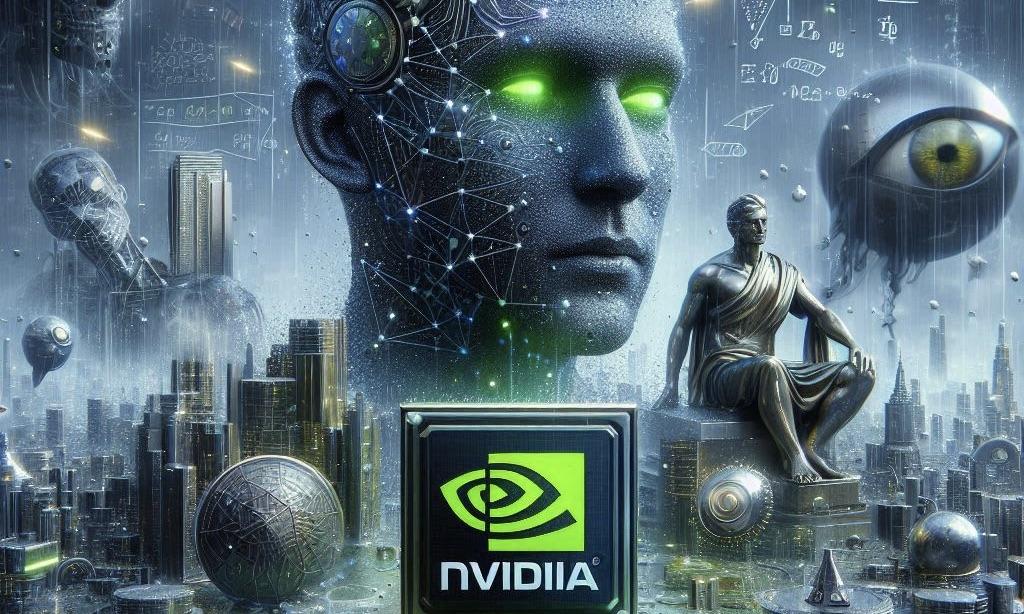Despite NVIDIA's $530 billion market cap loss, game theory indicates that the AI spending race among tech giants like Microsoft, Amazon, and Google is far from over, suggesting that the so-called AI bubble hasn't burst.
NVIDIA's Market Cap Falls $530 Billion, But Game Theory Suggests AI Spending Will Persist
With NVIDIA, the indisputable poster child of the ongoing AI mania, reaching its lowest price level in around two months on July 26, skeptics have declared that the AI bubble has burst. However, the increasing CapEx driven by game theory suggests otherwise.
Despite the recent correction in NVIDIA shares, which resulted in a market cap loss of approximately $530 billion, from a peak of around $3.335 trillion in June to $2.820 trillion recently, it's important to note that the rest of the Magnificent 7 mega-cap stocks have shown resilience. There has been a rotation from the tech-heavy Nasdaq 100 index into small-cap stocks, but this is not a sign of a complete market shift. Some analysts, including Hargreaves Lansdown's head of equity funds, Steve Clayton, have quickly pronounced the end of the AI bubble, but the tech industry's resilience suggests otherwise.
The crux of this bearish outlook lies in the disconnect between soaring AI-related CapEx and its minimal impact on revenue acceleration. Goldman Sachs recently highlighted this issue, questioning the benefits of rampant growth in AI-related CapEx. MIT professor Daron Acemoglu stated that AI would impact less than 5 percent of all productive tasks in the US over the next decade.
Tech Giants Relentlessly Invest in AI Amid Fears of Falling Behind, Driven by Strategic Game Theory
Despite the concerns about the AI bubble, it's essential to understand that the corporate giants are not slowing their AI-related spending for strategic reasons. In recent hours, the CEOs of Meta and Google have emphasized their fear of falling behind in the AI arms race if they scale back spending.
This strategic thinking drives relentless expenditure, which can be better understood through a game theory analysis by Sequoia Capital. According to Wccftech, this analysis describes a cycle of competitive escalation among Microsoft, Amazon, and Google, driven by the fear of being left out. This strategic approach should instill confidence in the audience about the tech giants' decision-making.
This defensive stance is primarily to protect their competitive advantage and market position. These cash-rich behemoths can afford large write-offs and aggressively invest in AI infrastructure to safeguard their dominance. Additionally, unbridled AI optimism is fueling explosive CapEx growth as companies believe innovation in AI will outpace current infrastructure development.
Given the recent comments from the CEOs of Google and Meta, it is unlikely that this AI arms race will end soon. The ongoing weakness in NVIDIA and other Magnificent 7 stocks will likely be temporary until these mega-caps stop outspending each other.



 Flare, Xaman Roll Out One-Click DeFi Vault for XRP Yield via XRPL Wallets
Flare, Xaman Roll Out One-Click DeFi Vault for XRP Yield via XRPL Wallets  Trump Orders Federal Agencies to Halt Use of Anthropic AI Technology
Trump Orders Federal Agencies to Halt Use of Anthropic AI Technology  Panama Investigates CK Hutchison’s Port Unit After Court Voids Canal Contracts
Panama Investigates CK Hutchison’s Port Unit After Court Voids Canal Contracts  OpenAI Pentagon AI Contract Adds Safeguards Amid Anthropic Dispute
OpenAI Pentagon AI Contract Adds Safeguards Amid Anthropic Dispute  Samsung and SK Hynix Shares Hit Record Highs as Nvidia Earnings Boost AI Chip Demand
Samsung and SK Hynix Shares Hit Record Highs as Nvidia Earnings Boost AI Chip Demand  Coupang Reports Q4 Loss After Data Breach, Revenue Misses Estimates
Coupang Reports Q4 Loss After Data Breach, Revenue Misses Estimates  Paramount Skydance to Acquire Warner Bros Discovery in $110 Billion Media Mega-Deal
Paramount Skydance to Acquire Warner Bros Discovery in $110 Billion Media Mega-Deal  Snowflake Forecasts Strong Fiscal 2027 Revenue Growth as Enterprise AI Demand Surges
Snowflake Forecasts Strong Fiscal 2027 Revenue Growth as Enterprise AI Demand Surges  Toyota Plans $19 Billion Share Sale in Major Corporate Governance Reform Move
Toyota Plans $19 Billion Share Sale in Major Corporate Governance Reform Move  OpenAI Hires Former Meta and Apple AI Leader Ruomin Pang Amid Intensifying AI Talent War
OpenAI Hires Former Meta and Apple AI Leader Ruomin Pang Amid Intensifying AI Talent War  Nintendo Share Sale: MUFG and Bank of Kyoto to Sell Stakes in Strategic Unwinding
Nintendo Share Sale: MUFG and Bank of Kyoto to Sell Stakes in Strategic Unwinding  BlueScope Steel Shares Drop After Rejecting Revised A$15 Billion Takeover Bid
BlueScope Steel Shares Drop After Rejecting Revised A$15 Billion Takeover Bid  Amazon’s $50B OpenAI Investment Tied to AGI Milestone and IPO Plans
Amazon’s $50B OpenAI Investment Tied to AGI Milestone and IPO Plans  Boeing Secures $166.8 Million U.S. Navy Contract for P-8A Engineering and Software Support
Boeing Secures $166.8 Million U.S. Navy Contract for P-8A Engineering and Software Support  Samsung Electronics Stock Poised for $1 Trillion Valuation Amid AI and Memory Boom
Samsung Electronics Stock Poised for $1 Trillion Valuation Amid AI and Memory Boom  Trump Warns Iran as Gulf Conflict Disrupts Oil Markets and Global Trade
Trump Warns Iran as Gulf Conflict Disrupts Oil Markets and Global Trade  Greg Abel’s First Berkshire Hathaway Shareholder Letter Signals Continuity, Caution, and Capital Discipline
Greg Abel’s First Berkshire Hathaway Shareholder Letter Signals Continuity, Caution, and Capital Discipline 































